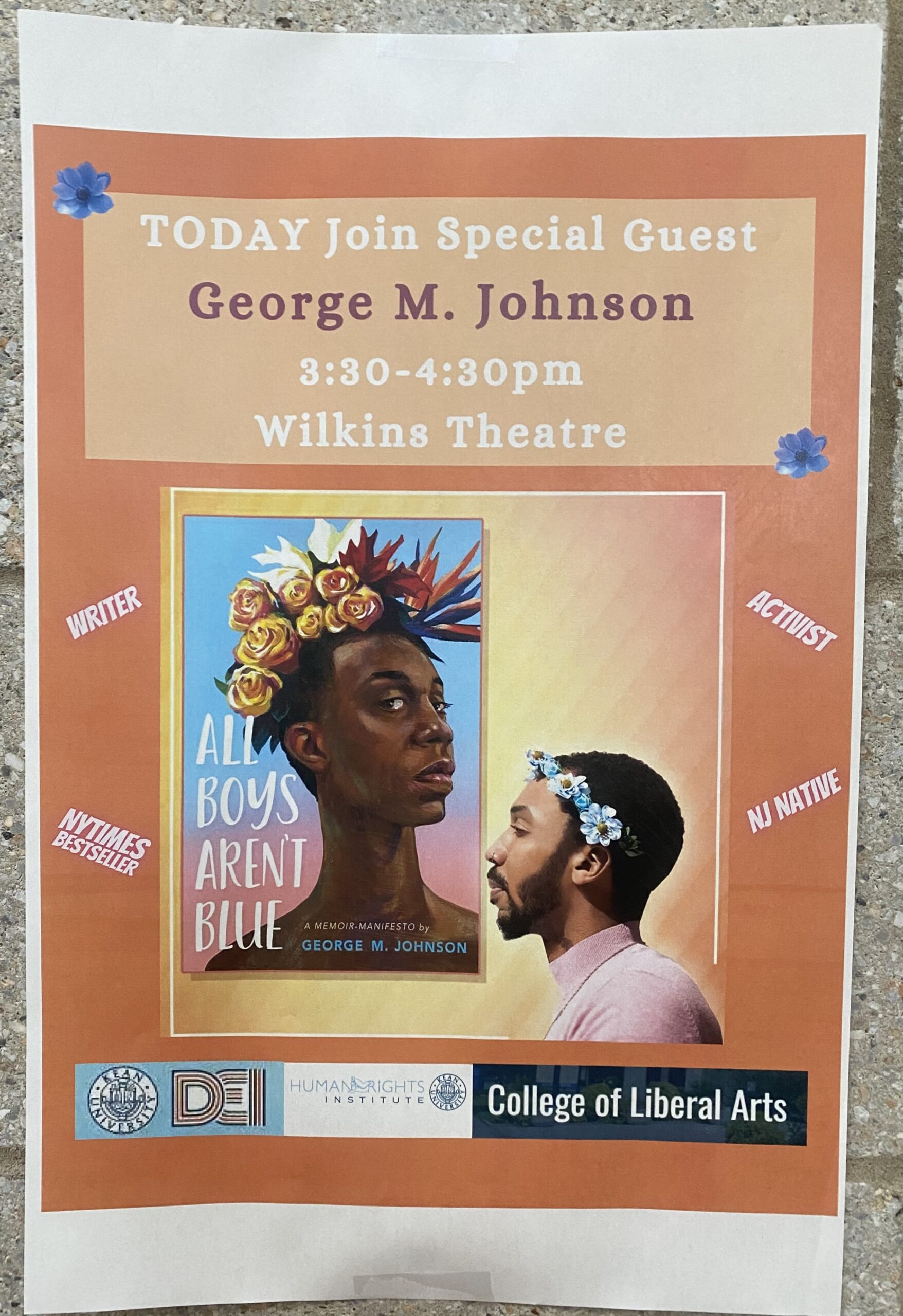By Julia Strugala | Published October 28, 2022
The Common Read program at Kean University held its book talk event on National Coming Out Day, Oct. 11, in Wilkins Theater. This year, best-selling author George M. Johnson graced the stage for a reading and discussion about his award-winning memoir-manifesto, “All Boys Aren’t Blue”.

The young adult nonfiction was first released in 2020 and follows the upbringing of Johnson through a series of essays. Growing up as a queer Black man in New Jersey and later moving to Virginia for college, they experienced a multitude of trials and tribulations throughout their adolescence.
In 2021, the American Library Association’s Office of Intellectual Freedom named it the third most banned and challenged book in the United States of the year. Because of its LGBTQIA+ content and profanity, the memoir manifesto has been banned from schools across the country.
Abriana Jetté, Kean English professor, said the program did not find out the book was banned until after the selection process, which made it stand out that much more. A student recommended, “All Boys Aren’t Blue” to be the common read book of the year and it received the most votes because of the deeply important message it conveys.
The purpose of the common read is to bring students together around a given text to discuss relevant and timely topics to create a shared intellectual experience for students in their first semester at Kean. As part of the transition to the Kean course, all freshmen are required to engage with the common read text picked for that school year.

The program was created by Jonathon Mercantini, acting dean of the college of liberal arts. It is something he has wanted Kean to incorporate into the freshman-year transition course for a long time.
“To me, I think the stories that George tells, I can imagine, would resonate with a lot of our students. Even if they haven’t had that exact same experience, I think that was something we wanted them to share,” Mercantini said.
Mercantini feels it is highly important to pick a book that students of all backgrounds would be able to connect to. Johnson’s story makes for a great Common Read selection because of the diversity of essays it contains, ranging from themes of family to gender identity.
“One thing with the Common Read that I’ve espoused from the beginning is that we want to make sure that we’re embracing a diversity of viewpoints. Having the students read something that’s different and takes you out of your comfort zone in a classroom setting,” Mercantini said.
Johnson began their career in writing because they wanted to make sure Gen Z had the knowledge and tools to understand the countries’ origins. In elementary school, Johnson was not taught about events in history such as the Emancipation Proclamation in its entirety. Gaps and chunks were missing from the historical timeline that they wanted to fill in for not only Black readers, but all readers.
The creation of All Boys Aren’t Blue was them freeing the 10-year-old version of themself that had something to say. At the same time, Johnson knew that there were still kids who were similar to those versions of themself who did not have anything to grab onto to make them feel heard.
Everything came full circle for Johnson when they found out Kean was the first college to choose the book as their common read. Since they are from Plainfield, New Jersey, it was very exciting to know that their best seller was going to be read, studied, and reviewed at a university not too far from home.

When Johnson was asked if there were moments in their life that they wished to include but had to take out, Johnson shared that four chapters were removed from the memoir. These later became a part of their second book, “We Are Not Broken”.
“The genius of being a writer is that you don’t know everything every time you write one. Books should be unapologetically about your truth,” Johnson said. “You’ll never finish writing if you wait until you know everything.”
Chapter 7 was one of the chapters that almost got cut out, but Johnson refused to let it be removed because it is about one of the most influential people in their life, their grandmother Nanny. Johnson’s grandmother was diagnosed with cancer right as they signed their book deal.
Johnson rewrote Chapter 7 from a different perspective, one where their grandmother was no longer around. The book was getting ready to be released as their grandmother was slowly passing away.
“[Nanny] was one of the best storytellers. I think that’s part of oral tradition in Black folks. I felt it was important to put Nanny’s stories onto paper so they never go away,” Johnson said. “If you don’t put stories like hers into the world, we lose them.”
Johnson’s grandmother lived through the Jim Crow Laws in the 1940s and experienced first-hand the racial segregation Black Americans endured during that time. Johnson felt it was crucial to publish her stories out into the world.
“We Are Not Broken” started being written when Johnson’s grandmother passed; their agent said to write about their grandmother and see where it takes them.
“It has been really cathartic to see people tweeting things she has said. Grief is love with nowhere to go, so I put it into my writing. Sometimes I talk about her and I well up and I know she’s around. She’s around today because I can feel it, like a wave of emotion comes over me,” Johnson said.
Johnson hopes the memoir gives queer people the ability to use the book as a bridge to form a much stronger connection with their families.
